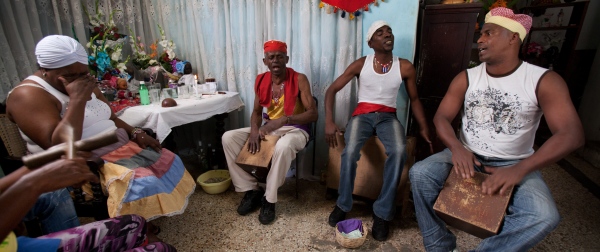Digital Santería in Cuba
And what we may learn from it.
Today I am going to share some thought about “Digital Santería” in Cuba, its influence on “digital obfuscation” in the same country and (THE topic of this post) what we may all “steal” from it, everywhere.
First, some definitions: in digital communications, says that post, “obfuscation is a method recommended by several digital security trainers and it consists of purposely providing untruthful information to the tech giants in order to avoid massive surveillance and mislead the vigilant oppressor”.
Santería is a religion developed in Cuba, that merges traditional Yoruba religion of West Africa, the Roman Catholicism and Spiritism:

The sincretism of Santeria partly comes from the fact that, in the 19th century, only Catholicism was allowed in Cuba. Therefore, people who wanted to keep practicing their native Yoruba beliefs and customs needed also for safety reason to look as if they were worshipping Catholic saints.
The author of Digital Santeria argues that that strategy of “obfuscation” is still very present in many practices of Cuban society, including the approaches to digital technologies under their own terms. and services. He also argues that everybody, everywhere should practice the same “digital obfuscation”, and I partly agree with him.
Cuban “obfuscation” of internet access
In neoliberal societies, literally everybody and their fridge is supposed to be permanently online. Cubans, instead, use the internet in very different ways.
On one hand, they have a solid culture of sharing and piracy through instances as “el paquete semanal” (“the weekly packet”): a 1TB hard drive full with movies and TV shows that is delivered weekly to Cuban homes.
That, argues the author, is a semi-official knowledge distribution scheme at a scale unconceivable in a West so “connected” that it incarcerates people who share scientific papers and limits legal entertainment to the little content available on Netflix and such.
Even more interesting are the different instances in which most Cubans access the internet: with prepaid cards, in official or unofficial “public WiFi spot, usually a square where Cubans of all ages dedicate their time mostly to talk with their friends and relatives abroad”.
These hard limits result in “everyone being super mindful about the time they’re spending online in order to not waste a single second of connection”.
For the same reason, “the attention to the online content is absolute [unlike in Western societies”, where permanent connectivity forces attention to split between offline and online tasks.
Obfuscation of Western digital culture
The final part of “Digital Santería” summarizes current western digital culture as nothing more than “fake news, digital sweatshops and celebration of consumption”, and it’s impossible to deny that it is at least part right. The author then mentions when he asked a Cuban Free Software advocate, what is going to happen to Cubans if western companies, in order to catch users, “install” the same culture of fake news etc… in the island. The answer, he says, was “why would people turn to proprietary software since free software is objectively much better?" In other words, the current dominance in Cuba of software “Free as in Freedom, not price” will obfuscate the poisoned apples of Microsoft, Facebook and friends.
If you ask me…
The confidence in a bright Free Software future for Cuba may be sorely misplaced. “Why would people turn to proprietary software since free software is objectively much better?" is exactly the philosophy practiced by the Free Software Foundation and GNU Project since the 80s, that lead to two billions Facebook users and almost nobody using Diaspora. If Cubans can avoid that outcome I’ll be very happy, but I would not bet the farm on it.
When it comes to “obfuscating” 24/7 connectivity, instead… I am not going to say that broadband access should not be available to everybody. But I am pretty sure that if enough western adults, or at least (for their kids) all western parents had the guts to follow the same “internet obfuscation diet” of Cubans… many things could go better, everywhere.
Images source: Santería on Wikipedia
Who writes this, why, and how to help
I am Marco Fioretti, tech writer and aspiring polymath doing human-digital research and popularization.
I do it because YOUR civil rights and the quality of YOUR life depend every year more on how software is used AROUND you.
To this end, I have already shared more than a million words on this blog, without any paywall or user tracking, and am sharing the next million through a newsletter, also without any paywall.
The more direct support I get, the more I can continue to inform for free parents, teachers, decision makers, and everybody else who should know more stuff like this. You can support me with paid subscriptions to my newsletter, donations via PayPal (mfioretti@nexaima.net) or LiberaPay, or in any of the other ways listed here.THANKS for your support!